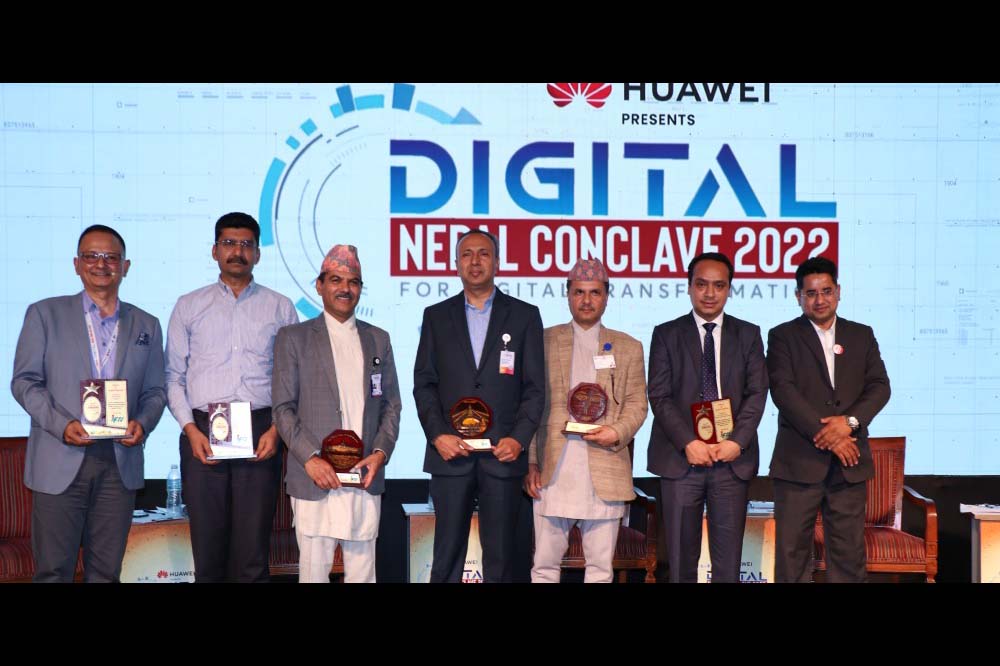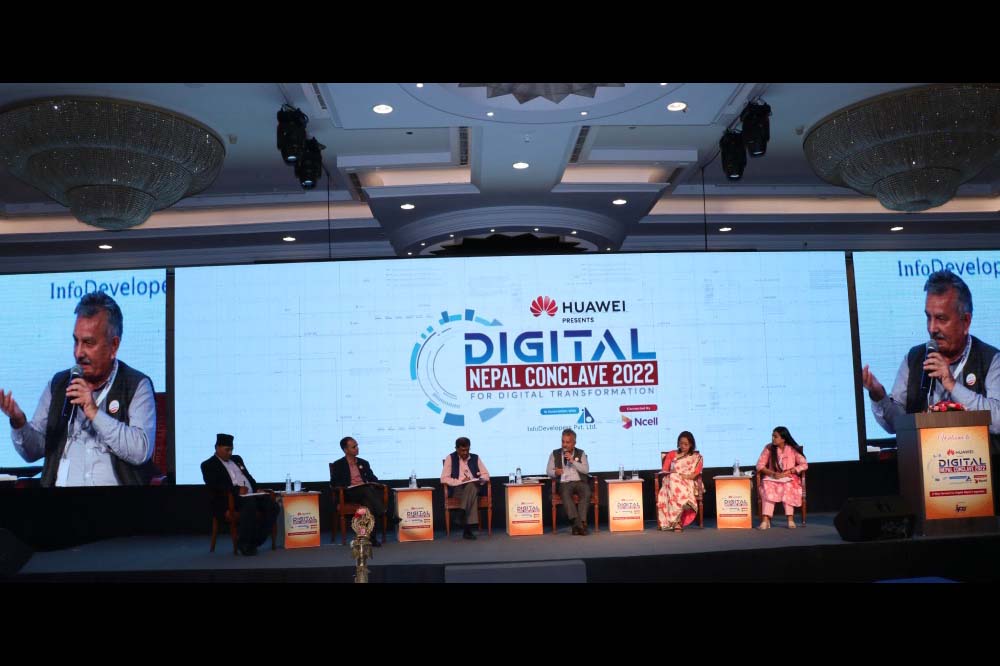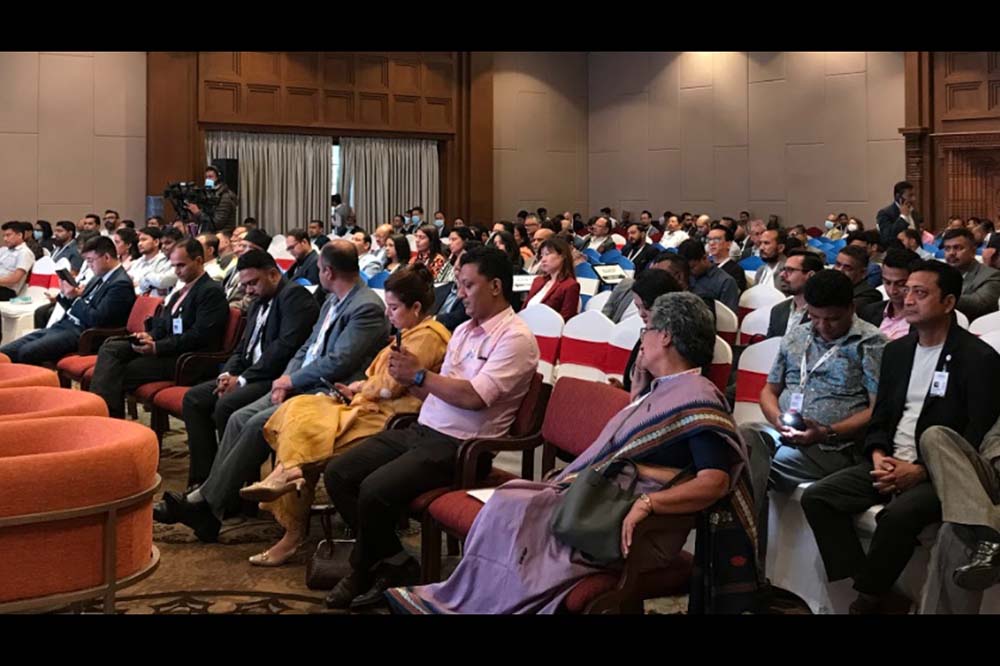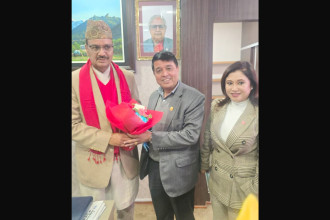
- Extensive discussion held for building digital ecosystem
 'Digital Nepal Conclave 2022’ organised by ICT Foundation Nepal in association with InfoDevelopers and Connected by Ncell in Kathmandu.[/caption]
Likewise, three working papers by Sajana Maharjan Amatya, Program Director of Data for Development and Asia Foundation, Prasanna Dhungel, CEO of GrowByData, and Selina Dangol, IT Director at the Ministry of Federal Affairs and General Administration, were presented during the third dialogue, 'Data Gaps: Bringing the Data Into the Center Stage.' The dialogue included former Director General of the Department of Information Technology Birendra Kumar Mishra and former Finance Minister Surendra Pandey.
The main problem in Nepal, according to the speakers at the dialogue session, is a lack of data framework and data quality. Lack of data literacy, according to speakers, is posing a threat to data security and privacy. According to the speakers, the goal of data export should be to turn the country into a data drive. Similarly, a discussion on 'Foundation for the Digital Economy and Investment Opportunity' was held during the fourth dialogue session. Sushil Bhatt, CEO of Nepal Investment Board, Bidhyabaridhi Sigdel, CEO of Dolma Impact Fund, Sanjay Golchha, MD of CEO Neoteric Nepal, Siddhant Raj Pandey, CEO of Business Oxygen and Karvika Thapa, CEO of Kimbu Tech were all in attendance at the session.
The private sector could not be attracted, according to the speakers, because the government could not lead investment in the ICT sector. They also claimed that foreign investment could not be attracted because there was a lack of reliable data on the ICT sector's productivity. The fifth dialogue on 'Emerging Tech and Innovation for Digital Transformation' was held on the second day of the Conclave. Speakers at the dialogue said that, despite the fact that the emerging technology-oriented economy has a strong domestic workforce, there is a sustainability issue due to intellectual exodus.
The government, according to the speakers at the dialogue, needs to create a framework with a long-term plan to keep skilled manpower in emerging technologies. Dr Suresh Manandhar, AI Faculty President of Madan Bhandari University of Science and Technology Development Board, Ncell's CTEO Adil Israr, AI researcher Dr Dovan Rai, Binay Raut, CEO of Paaila Technology, and Dean of Kathmandu University School of Engineering Prof Dr Manish Pokharel were in attendance during the discussion session. Also, Ken Ehrhart, the Founder and CEO of Paracoma Inc, presented a paper titled "The Emerging Technology Landscape and Digital Nepal" at the session.
Likewise, the sixth dialogue session was held on the topic of "Fostering Digital Entrepreneurship and Champions for Digital Nepal." Dr Ram Kumar Phuyal, member of the National Planning Commission, Manoj Ghimire, CEO and Co-Founder of Rara Labs, Sixit Bhatta, CEO and Co-Founder of Tootle and Mallika Bhattarai, COO of Nepal PayTime, were all present at the session.
Despite the growth of digital entrepreneurship, the speakers in the session stated that competitiveness has not increased. According to them, new startups tend to follow larger companies rather than innovations. They also advocated for the market to concentrate on creating its own market by raising prices. The speakers also suggested that the government's policy on technology entrepreneurship and innovation should work together. They believe that problems should be identified and solved through research and development in the field of startups.
Discussions on 'Strengthening Trust Security and Privacy Regime for Digital Ecosystem' were held during the 7th Dialogue Session. The session was attended by Anil Kumar Dutta, Joint Secretary, Ministry of Communications and Information Technology, Prof Dr Subarna Shakya, Director, IT Innovation Center, Tribhuvan University, Vishal Mani Upadhyay, CIO of Ncell, Prabin Subedi, Advocate, Paramount Legal Advisory Services, and Narendra Mainali, Chief Information Security Officer (CISO) of NIC Asia Bank.
Narayan Koirala, MD of Eminence Ways, presented the working paper at the session. Speakers said that unless data security and confidentiality are guaranteed, trust in the digital world will not be established, and digital transformation will not be possible. Although the Personal Privacy Protection Act contains some provisions, the speakers warned that because the information is scattered, it could be misused. To avoid such risks, the speakers suggested that the National Cyber Security Act be implemented quickly.
[caption id="attachment_25315" align="alignnone" width="1000"]
'Digital Nepal Conclave 2022’ organised by ICT Foundation Nepal in association with InfoDevelopers and Connected by Ncell in Kathmandu.[/caption]
Likewise, three working papers by Sajana Maharjan Amatya, Program Director of Data for Development and Asia Foundation, Prasanna Dhungel, CEO of GrowByData, and Selina Dangol, IT Director at the Ministry of Federal Affairs and General Administration, were presented during the third dialogue, 'Data Gaps: Bringing the Data Into the Center Stage.' The dialogue included former Director General of the Department of Information Technology Birendra Kumar Mishra and former Finance Minister Surendra Pandey.
The main problem in Nepal, according to the speakers at the dialogue session, is a lack of data framework and data quality. Lack of data literacy, according to speakers, is posing a threat to data security and privacy. According to the speakers, the goal of data export should be to turn the country into a data drive. Similarly, a discussion on 'Foundation for the Digital Economy and Investment Opportunity' was held during the fourth dialogue session. Sushil Bhatt, CEO of Nepal Investment Board, Bidhyabaridhi Sigdel, CEO of Dolma Impact Fund, Sanjay Golchha, MD of CEO Neoteric Nepal, Siddhant Raj Pandey, CEO of Business Oxygen and Karvika Thapa, CEO of Kimbu Tech were all in attendance at the session.
The private sector could not be attracted, according to the speakers, because the government could not lead investment in the ICT sector. They also claimed that foreign investment could not be attracted because there was a lack of reliable data on the ICT sector's productivity. The fifth dialogue on 'Emerging Tech and Innovation for Digital Transformation' was held on the second day of the Conclave. Speakers at the dialogue said that, despite the fact that the emerging technology-oriented economy has a strong domestic workforce, there is a sustainability issue due to intellectual exodus.
The government, according to the speakers at the dialogue, needs to create a framework with a long-term plan to keep skilled manpower in emerging technologies. Dr Suresh Manandhar, AI Faculty President of Madan Bhandari University of Science and Technology Development Board, Ncell's CTEO Adil Israr, AI researcher Dr Dovan Rai, Binay Raut, CEO of Paaila Technology, and Dean of Kathmandu University School of Engineering Prof Dr Manish Pokharel were in attendance during the discussion session. Also, Ken Ehrhart, the Founder and CEO of Paracoma Inc, presented a paper titled "The Emerging Technology Landscape and Digital Nepal" at the session.
Likewise, the sixth dialogue session was held on the topic of "Fostering Digital Entrepreneurship and Champions for Digital Nepal." Dr Ram Kumar Phuyal, member of the National Planning Commission, Manoj Ghimire, CEO and Co-Founder of Rara Labs, Sixit Bhatta, CEO and Co-Founder of Tootle and Mallika Bhattarai, COO of Nepal PayTime, were all present at the session.
Despite the growth of digital entrepreneurship, the speakers in the session stated that competitiveness has not increased. According to them, new startups tend to follow larger companies rather than innovations. They also advocated for the market to concentrate on creating its own market by raising prices. The speakers also suggested that the government's policy on technology entrepreneurship and innovation should work together. They believe that problems should be identified and solved through research and development in the field of startups.
Discussions on 'Strengthening Trust Security and Privacy Regime for Digital Ecosystem' were held during the 7th Dialogue Session. The session was attended by Anil Kumar Dutta, Joint Secretary, Ministry of Communications and Information Technology, Prof Dr Subarna Shakya, Director, IT Innovation Center, Tribhuvan University, Vishal Mani Upadhyay, CIO of Ncell, Prabin Subedi, Advocate, Paramount Legal Advisory Services, and Narendra Mainali, Chief Information Security Officer (CISO) of NIC Asia Bank.
Narayan Koirala, MD of Eminence Ways, presented the working paper at the session. Speakers said that unless data security and confidentiality are guaranteed, trust in the digital world will not be established, and digital transformation will not be possible. Although the Personal Privacy Protection Act contains some provisions, the speakers warned that because the information is scattered, it could be misused. To avoid such risks, the speakers suggested that the National Cyber Security Act be implemented quickly.
[caption id="attachment_25315" align="alignnone" width="1000"] Participants are seen at 'Digital Nepal Conclave 2022’ organised by ICT Foundation Nepal in association with InfoDevelopers and Connected by Ncell in Kathmandu.[/caption]
In the conclave's eighth dialogue, the speakers discussed the topic of "Digital Innovation and Beyond for Digital Society." Guruprasad Poudel, Executive Director of Rashtra Bank's Payment Services Department, Nilesh Man Singh, CEO of NCHL, Nora Asha Gurung, Product Director of Machnet Technologies Inc, and Subhash Sapkota, CEO of eSewa attended the discussion session.
NCHL CEO Nilesh Man Singh and Nabil Bank Limited CEO Anil Keshary Shah presented working papers on the state and development of the financial technology sector during the session. According to the speakers, changing one's mindset is more difficult than developing technology in the field of finance technology. They also suggested that so many digital payments outside the formal system should be included in the system. The speakers stated that innovation should be linked to digital commerce and that policies and laws should be updated in tandem with innovation.
Three working papers on 'Unleashing the Potentials for Building Digital Dealership to Strengthen Governance' were presented during the program's ninth dialogue session. Nagesh Badu, Ministry of Federal Affairs and General Administration's IT and eGovernance Specialist, Vivek Samsher Rana, Digital Enterprise Architect, and Anil Kumar Dutta, Joint Secretary of the Ministry of Communications, presented the working paper. According to the speakers, digital services can only be effective if leaders are technically prepared and human and financial resources are managed effectively.
They claimed that, while Nepal is moving toward digital transformation, it has only reached the stage of digital interaction and business and has not yet reached the stage of transformation. They also claimed that the government's digital working system was duplicative and that uniformity in standards was required. On the basis of cost service and implementation, they suggested that there should be conceptual clarity in digitization.
The programmes final dialogue session focused on 'Paving Ways for Digital Transformation in Nepal: Key Action Points.' Arjun Prasad Pokhrel, Secretary, Ministry of Industry, Commerce and Supplies; Kewal Prasad Bhandari, Member Secretary of National Planning Commission; Baikuntha Prasad Aryal, Joint Secretary of Ministry of Education Science and Technology Communications, Dipesh Bista, IT Advisor to the Prime Minister; and Vishnu Kumar Agrawal, President of Confederation of Nepalese Industries (CNI) were present at the session.
The session's participants emphasized the importance of collaboration in the transformation of Digital Nepal. They stated that the government and the private sector could not achieve digital transformation on their own and that all parties needed to work together. Speakers from the private and public sectors agreed that there is a lot of potential for the IT industry to grow if IT parks can be built quickly and tax incentives for IT companies can be arranged, similar to what is done in India. They also expressed gratitude to the government for lowering the Rs 50 million minimum foreign direct investment cap, and stated that there should be no investment threshold for the IT sector.
READ ALSO:
Participants are seen at 'Digital Nepal Conclave 2022’ organised by ICT Foundation Nepal in association with InfoDevelopers and Connected by Ncell in Kathmandu.[/caption]
In the conclave's eighth dialogue, the speakers discussed the topic of "Digital Innovation and Beyond for Digital Society." Guruprasad Poudel, Executive Director of Rashtra Bank's Payment Services Department, Nilesh Man Singh, CEO of NCHL, Nora Asha Gurung, Product Director of Machnet Technologies Inc, and Subhash Sapkota, CEO of eSewa attended the discussion session.
NCHL CEO Nilesh Man Singh and Nabil Bank Limited CEO Anil Keshary Shah presented working papers on the state and development of the financial technology sector during the session. According to the speakers, changing one's mindset is more difficult than developing technology in the field of finance technology. They also suggested that so many digital payments outside the formal system should be included in the system. The speakers stated that innovation should be linked to digital commerce and that policies and laws should be updated in tandem with innovation.
Three working papers on 'Unleashing the Potentials for Building Digital Dealership to Strengthen Governance' were presented during the program's ninth dialogue session. Nagesh Badu, Ministry of Federal Affairs and General Administration's IT and eGovernance Specialist, Vivek Samsher Rana, Digital Enterprise Architect, and Anil Kumar Dutta, Joint Secretary of the Ministry of Communications, presented the working paper. According to the speakers, digital services can only be effective if leaders are technically prepared and human and financial resources are managed effectively.
They claimed that, while Nepal is moving toward digital transformation, it has only reached the stage of digital interaction and business and has not yet reached the stage of transformation. They also claimed that the government's digital working system was duplicative and that uniformity in standards was required. On the basis of cost service and implementation, they suggested that there should be conceptual clarity in digitization.
The programmes final dialogue session focused on 'Paving Ways for Digital Transformation in Nepal: Key Action Points.' Arjun Prasad Pokhrel, Secretary, Ministry of Industry, Commerce and Supplies; Kewal Prasad Bhandari, Member Secretary of National Planning Commission; Baikuntha Prasad Aryal, Joint Secretary of Ministry of Education Science and Technology Communications, Dipesh Bista, IT Advisor to the Prime Minister; and Vishnu Kumar Agrawal, President of Confederation of Nepalese Industries (CNI) were present at the session.
The session's participants emphasized the importance of collaboration in the transformation of Digital Nepal. They stated that the government and the private sector could not achieve digital transformation on their own and that all parties needed to work together. Speakers from the private and public sectors agreed that there is a lot of potential for the IT industry to grow if IT parks can be built quickly and tax incentives for IT companies can be arranged, similar to what is done in India. They also expressed gratitude to the government for lowering the Rs 50 million minimum foreign direct investment cap, and stated that there should be no investment threshold for the IT sector.
READ ALSO:
Published Date: June 21, 2022, 12:00 am
Post Comment
E-Magazine
RELATED B360 National


-1767078953.jpeg)

-1767074601.jpeg)
-1767071872.jpeg)